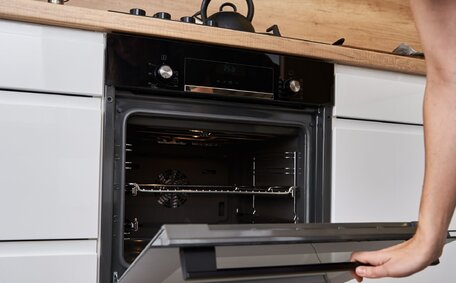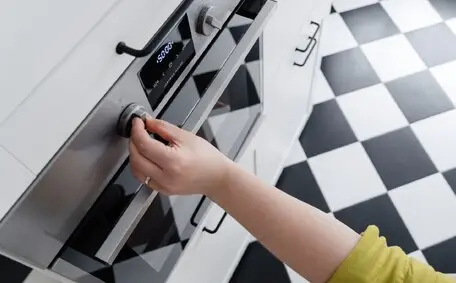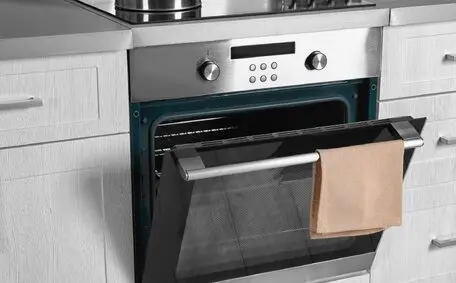40% of house fires in NSW are caused by electrical faults—are you willing to take the risk? It’s tempting to try to save a few bucks by doing home improvement tasks yourself. And with all the how-to videos floating around online, it feels like anyone with a screwdriver and some grit can take on anything, even installing an electric oven. But here’s the cold, hard truth: you might be breaking the law, voiding your warranty, and putting your home at serious risk.
Around 40% of house fires in NSW each year are linked to electrical faults and misused appliances. That’s not a small number, and many of those fires start with something as simple as an incorrectly installed oven.
This practical, no-nonsense guide lays out exactly when you can tackle oven installation on your own — and when it’s best (and legally required) to call in a licensed sparkie. Let’s get into it.
Can You Legally Install an Oven Yourself in Australia?
Here’s the deal: if your oven is hardwired, you legally cannot install it yourself. Full stop.
Australian law is crystal clear on this. Any electrical work involving direct wiring into your home’s circuitry must be done by a licensed electrician. This includes installing hardwired ovens, which are typically higher-powered and require a dedicated circuit. Each state — whether it’s NSW, VIC, or QLD — enforces this through its own building and safety codes.
![Installing Oven Should You Diy Installing Oven Diy]()
On the other hand, plug-in ovens, which come with a standard three-pin plug, are generally considered low-risk and may be installed by the homeowner. That said, even plug-in models require the right outlet and a compatible circuit to handle the amperage safely.
One of the biggest legal pitfalls DIYers fall into? Skipping the compliance certificate. After a licensed electrician completes an installation, they issue this document to certify that the job meets all regulatory standards. Without it, your installation might fail safety inspections — and insurers can use the lack of certification as a reason to deny claims.
So, if you’re asking “Can I install my new oven myself?” the answer depends on the type — but if it’s hardwired, it’s best left to the pros.
What Can Go Wrong With a DIY Oven Installation?
Let’s not sugarcoat it: botching an oven install can go sideways in a dozen different ways — and fast.
Start with the obvious risks:
That’s just the beginning. An incorrectly installed oven can:
- Damage your appliance, turning a brand-new unit into a costly paperweight.
- Compromising your home’s wiring can lead to bigger electrical issues down the line.
- Trip circuit breakers repeatedly, making everyday use a nightmare.
- Void the oven’s manufacturer warranty, which almost always requires professional installation.
- Kill your insurance claim, especially after a fire or electrical fault.
Take this real-world scenario: A DIYer in Western Sydney installed a hardwired oven but didn’t isolate the power correctly. The result? The oven kept tripping the breakers every time it hit 180°C. An electrician had to come in, rewire the unit, and replace part of the switchboard — all costing double what the initial install would’ve been.
Moral of the story: you’re not just playing with wires — you’re playing with fire.
Understanding Hardwired vs Plug-In Ovens
Knowing the difference between hardwired and plug-in ovens isn’t just helpful — it’s crucial.
- Plug-in ovens connect via a standard three-prong power plug and are usually lower-powered. These are often freestanding or benchtop models.
- Hardwired ovens connect directly to the home’s electrical circuit — no plug, just wiring. They typically draw higher current and are installed flush into cabinetry or wall units.
Hardwired ovens usually draw more than 10 amps, meaning they’ll require:
- A dedicated circuit
- An isolation switch (often installed within arm’s reach of the oven)
- A licensed electrician to handle it all safely and legally
If your new oven manual mentions a 15 or 20 amp requirement, it’s a safe bet you’re in hardwired territory.
Tools, Time, and Skill: What DIY Really Involves
Think oven installation is a simple plug-and-play? Think again.
To do it properly (and safely), you’d need:
- A voltage tester
- Multimeter
- Wire strippers
- Power drill
- Screwdrivers
- Insulation tape
- Knowledge of your home’s circuit layout and electrical capacity
Even with the tools, the job demands precision, awareness of safety standards, and the ability to troubleshoot under pressure. Miswire one terminal, and you could end up with a scorched wall socket — or worse.
Add in the time — anywhere from two to five hours for a novice — and the cost of any mistakes. Suddenly, hiring a licensed electrician doesn’t just look safer. It looks smarter.
What Licensed Electricians Bring to the Table
Hiring a licensed electrician isn’t just ticking a legal box — it’s a value-packed decision that pays off in multiple ways.
![Testing Circuits For Electric Ovens Testing Circuits Electric Ovens]()
Here’s what they offer:
- Years of hands-on experience, so they can complete installations quickly and correctly.
- Up-to-date knowledge of all relevant codes and standards.
- Compliance certificates, proving your oven is installed legally and safely.
- Integration with your home’s system, ensuring the new oven is connected to a properly rated circuit and won’t overload your board.
- Peace of mind — no flickering lights, tripped breakers, or "what’s that smell?" moments down the track.
And let’s not forget cost savings. Faulty DIY installs often lead to repair bills far greater than a straightforward professional fee. A good electrician may even spot issues in your existing setup — like old cabling or an undersized switchboard — and address them before they become serious problems.
Need a Hand? We’ll Handle the Hardwiring
We get it — rolling up your sleeves and doing it yourself can be satisfying. But when it comes to hardwired ovens, satisfaction won’t keep your home safe — or your insurance valid.
Leave it to us. At Bright Force Electrical, we handle oven installations every day. Our licensed electricians know exactly how to wire your new unit, issue the proper compliance certificates, and make sure your setup meets every requirement from the fuse box to the wall outlet.
Don’t risk a fine, a fire, or a fried appliance just to save a few bucks. When it’s hardwired, it’s hands off.
Book Your Oven Install With Bright Force Electrical
You bought the perfect oven — sleek, modern, ready to roast, bake, and grill like a pro. Don’t let installation be the step that undoes all that excitement.
At Bright Force Electrical, we make the process easy, safe, and fully compliant. Our licensed electricians handle everything from disconnection of the old unit to hardwiring your new appliance with precision, all backed by a Certificate of Compliance. That means you’re covered legally, financially, and practically.
We don’t just plug it in — we ensure it’s built into your home the right way, the first time.
At Bright Force Electrical, we handle electric oven installations with the care and compliance your home deserves. Reach out to our expert team today to book a professional service you can rely on.










